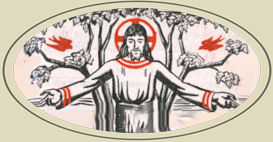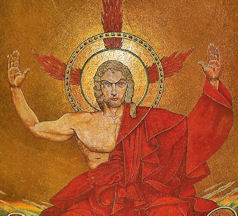» Enjoy our Liturgical Seasons series of e-books!
His master said to him in reply, 'You wicked, lazy servant! So you knew that I harvest where I did not plant and gather where I did not scatter? Should you not then have put my money in the bank so that I could have got it back with interest on my return? Now then! Take the talent from him and give it to the one with ten.' For to everyone who has, more will be given and he will grow rich; but from the one who has not, even what he has will be taken away (Matt 25:26-29).
Today is the feast of St. Albert the Great which is superseded by the Sunday Liturgy.
Click here for commentary on the readings in the 1962 Missal of the Roman Rite.
Sunday Readings
The first reading is taken from the Book of Proverbs 31:10-13, 19-20, 30-31. The verses chosen for today are taken from the last half of the last chapter of the book and are a hymn in praise of the ideal wife. The author saw to it that the part that a wise, prudent and industrious wife plays in a man's life, and hence in the life of the nation, deserved to be stressed and admired.
The second reading is from the first Letter of St. Paul to the Thessalonians 5:1-6. In this reading St. Paul continues his discussion of the parousia. He tells his Thessalonian converts that they know as much as he does about the time of that second coming. He had already told them in his preaching that our Lord had said that it would be unexpected. However, this need not frighten them, they would be prepared because they were living their Christian faith every day.
The Gospel is from St. Matthew 25:14-30 or 25:14-15, 19-21. The lesson of this parable, like all the teaching of the gospel, is as applicable to us today as it was to the first generation of Christians. In its relation to Christ and to his divine Father our world today is very similar to first century Palestine. Christ and God have opponents and followers. Their opponents today have the very same reasons that moved the Pharisees and leaders of the people in Christ's day. They want their messianic kingdom here on earth, a kingdom of pleasure and plenty; they want no limits set to their freedom to follow their own earthly inclinations. Their pride in their own self-exalted dignity will not let them bow the head to any deity or divine authority which does not conform to their standards. Like the Pharisees they keep on trying to convince themselves that Christianity is not true, that Christ will not reign, that there will be no day of reckoning.
Yet with all their efforts to get rid of Christ and God, the small inner voice of conscience is not completely silenced. It has the nasty habit of reminding them of their folly. They have their troubled moments when the epicurean motto "eat, drink, sleep and be merry" does not somehow ring true.
For the followers of Christ who are sincere in their efforts, the parable has a message of encouragement and consolation. At times the road we have to travel seems strewn with obstacles, our battles seem never-ending, yet God has provided each one of us with the necessary helps to ensure the final victory. These helps are given according to each one's need. Those servants in the parable who received five and two talents used them faithfully and successfully. He who received one talent needed only one, and could have succeeded with it had he been a faithful servant.
Eternal happiness is the divine reward for an earthly service faithfully rendered. The false excuse of the third servant is repeated in many forms among us still "God is too austere, he could not expect me to make such sacrifices. I have to provide for myself; his promises and threats may be only empty words. He may never return to demand a reckoning, to settle accounts with us. These and all other such excuses are proved false in this parable.
God is a kind Father who has our eternal interests at heart. He does expect us to make the necessary sacrifices. He showed us the way on Calvary. When working for God we are really providing for our own future; his external glory and our eternal salvation are the fruits of the same labor. He will certainly return to settle accounts—it will then be too late to make any changes. Let us be wise and make the changes now while we have time and then our books will be in order on the day of reckoning.
—Excerpted from The Sunday Readings by Fr. Kevin O'Sullivan, O.F.M.
 Commentary on the Readings for the Sixth Resumed Sunday after Epiphany
Commentary on the Readings for the Sixth Resumed Sunday after Epiphany
"The kingdom of heaven is like a grain of mustard seed,. . .smallest of all the seeds, but when it grows up it. . .becomes a tree, so that the birds. . .dwell in its branches" (Gospel).
So the Church from humble beginnings in underground Catacombs, has stretched out to the remotest ends of foreign missions. . . a living shelter for man as he flees upward from the earth; a miraculous leaven transforming fallen human culture into the Divine.
Yes, the Life of Christ is a leaven hiding, as it were, from the time of our Baptism in the three measures of faith, hope and charity until all of our humanity is leavened. Like the first Christians, we, too, are to become a pattern to all, so that our neighbors in Macedonia and Achaia (Epistle), like birds of the air, will come and dwell in the branches of the Church.
—Excerpted from My Sunday Missal, Confraternity of the Precious Blood






